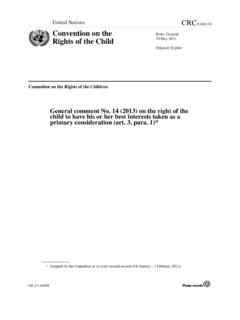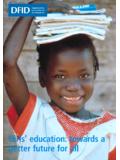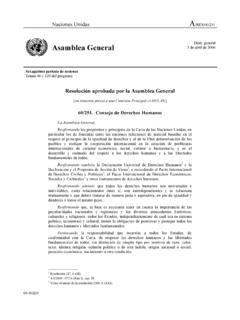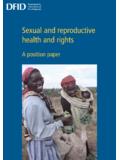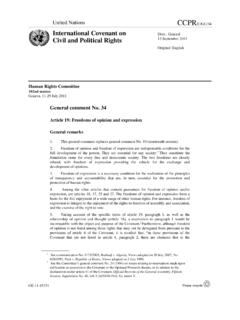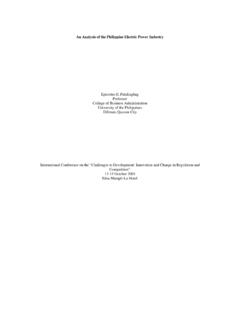Transcription of List of Issues - Office of the United Nations High ...
1 W o r l d O r g a n i s a t i o n A g a i n s t T o r t u r e Box 21 1211 Geneva 8 Switzerland Tel.: 0041/22 809 49 39 / Fax: 0041/22 809 49 29 E mail: / Web: List of Issues arising from the Initial fourth Periodic Report of the Philippines to the Committee on Economic, Social and Cultural Rights November 2007 A report compiled by the World Organisation Against Torture,with contributions from Karapatan and Pax Christi In the context of the project Preventing Torture and Other Forms of Violence by Acting on their Economic, Social and Cultural Root Causes The European Union through the European Initiative for Democracy and Human Rights is providing substantial support for this project. The contents of this report are the responsibility of the authors and do not necessarily reflect the views of the European Table of contents 1. Addressing Poverty and Violence: the very heart of human rights protection Introduction The gap between legal provision and implementation Poverty as a root cause of violence in the Philippines 2.
2 Trade Liberalization, Foreign Investment and the Risk of Violence 3. Land Reform and Violence 4. Indigenous Peoples Rights and Violence Poverty inequality and violence against indigenous peoples The case of the impact of the Canatuan Mineon the Subanon Community, Island of Mindanao 5. Forced Evictions and the Right to Housing Urban demolitions and evictions Demolitions in Metro Manila 6. Poverty and Violence Against Women Violence against indigenous women and women living in rural areas Women migrant workers and violence The impact of trade liberalization 7. Poverty and Violence Against Children Street children, juvenile justice and violence Child labour and child trafficking 8. Overseas Workers and Violence 9. Extrajudicial Executions and Forced Disappearances of Economic, Social and Cultural Rights Activists Impunity The Melo Commission Economic, social and cultural rightsdefenders and the 2007 Anti terrorism Act 1.
3 Addressing Poverty and Violence: the very heart of human rights protection Introduction It is increasingly acknowledged that torture and cruel, inhuman and degrading treatment or punishment and other forms of violence are related in many ways to disrespect for economic, social and cultural rights. 1 If, therefore, these phenomena are to be effectively eliminated, then their economic, social and cultural root causes must be, first, understood and, secondly, effectively addressed. 2 The converse equally applies: acting to reduce levels of violence in a given society is a fundamental step toward ensuring the widespread enjoyment of economic, social and cultural rights. In the case of the Philippines, conflict and lack of security expose Filipinos to situations that severely impede their possibility of escaping from poverty, of working in just and favourable conditions, of providing care and education to their children and enjoying an adequate standard of living and the highest attainable standard of health.
4 How the denial of economic, social and cultural rights is related to torture and other forms of violence The poor, excluded and other vulnerable groups are often the first and most numerous victims of violence, including torture and cruel, inhuman and degrading treatment. Levels of violence in a given community or society can be such that individuals or groups are unable to enjoy their economic, social and cultural rights. Violence is inflicted on persons because they demand respect for economic, social or cultural rights their own or those of others. Denials of economic, social and cultural rights are carried out so violently as to be considered ill treatment under international treaties. Certain violations of economic, social or cultural rights can be characterized as cruel, inhuman and degrading treatment, or in some cases as a denial of the right to life.
5 Policies and programmes by governments, private actors or development and financial institutions can exacerbate poverty and inequalities and lead to increased levels of official, criminal and domestic violence. This list of Issues , prepared by the World Organisation Against Torture (OMCT) in consultation with the Karapatan and Pay Christi, is intended to draw attention to some of the key areas where there is a direct and clear link between violations of economic, social and cultural rights and violence, or the threat of violence in the Philippines. Providing guidance to the Government of the Philippines on how to address obstacles to the full enjoyment of their citizens social, economic and cultural rights is, therefore, not only and end in itself, but also a central strategy for reducing levels of violence in Filipino society. As Ms. Louise Arbour, UN High Commissioner for Human Rights has observed in her preface to the OMCT study on this theme, the question of how to prevent or reduce violence, including torture, by acting on its root causes, often found in violations of economic, social and cultural rights , is one that goes to the very heart of human rights protection.
6 34 The gap between legal provision and implementation To understand the human rights situation in the Philippines, it is important to recognise that the countrypossesses a comprehensive legal framework that, de iure, offers vital safeguards to Filipino citizens. However, de facto, the law is often inconsistently implemented and enforced. In the specific case ofeconomic,social and cultural rights, these are clearly provided for under the law,but in practice they are poorly protected. This is due in part to loopholes in the law itself and in part to endemic problems related to poor governance and corruption. The protection of workers rights, child rights, indigenous peoples rights, as well as land and housing rights among others, is a source of concern in terms of the effectiveness and consistency of the application of the country s legal provisions. Poverty as a root cause of violence in the Philippines The growth of the country s economy has not been accompanied by an equitable distribution of wealth and therefore has not contributed significantly to the reduction of poverty.
7 It is reported that in the Philippines the poor remain poor as a result oftwo principal factors: the persistence of structural inequalities, and political uncertainty. 4 In the Philippines, conflict and violence are generated by poverty, inequality (both political power and economic resources in the hands of an elite), marginalization and poor governance. At the same time, as underlined by the UN Common Country Assessment ( 2004), equitable economic development in the Philippines can be only achieved if peace and security standards are met. 5 Poverty in the Philippines is clearly manifested in both rural and urban areas. Poverty in rural areas is persistent and deep rooted, and approximately two thirds of the country s poorlive in rural areas. The large majority of farmers and peasants do not own the land on which they work, and this discourages agricultural improvements and diversifications of crops.
8 6 Government land reform programmeshave failed to increase agricultural productivity orintroduce improvements, and local structures of governance have been unable to influence this process. Affected groups and marginalized populations have found an alternative in armed rebellion to promote their concerns and meet their needs. These movements, particularly active in the Southern Philippines, are motivated by a sense of social injustice and exclusion. Armed conflict, in turn, aggravates poverty of the communities directly affected, and the country in general. 7 The high rate of urban poverty is largely a direct consequence of rural poverty. The migration flow rural poor to the cities has led to a rapid urbanisation process that has produced new urban poor, underemployment and unemployment, as well as lack of housing and basic urban poor make their daily livelihood in the informal sector.
9 They must deal with social exclusion and lack of appropriate policy on housing tenure, security and freedom from eviction or displacement. As a result, it is estimated that there are some 262,000 informal settlements in the Philippines where there is a risk of conflict and violence. Sustainable urbanisation is a major challenge for the Philippines, and one that inevitably requires a coordinated, multidimensional approach. 85 2. Trade Liberalization, Foreign Investment and the Risk of Violence In order to attract foreign capital and to accelerate domestic economic development, the Government of the Philippines has engaged in liberalization initiatives that risk undermining the economic, social and cultural rights of certain communities. Farmers struggle in the face of foreign investment and powerful landowners who are converting land from agricultural to industrial use. Indigenous peoples are struggling to protect their ancestral lands from the impact of mining, deforestation, and other development projects.
10 Vulnerable groups such as these face serious challenges in opposing corporate interests and foreign investment companies. 9 Consequently, only the wealthiest citizens are able to benefit from the iniquitous effects ofthis poorly planned trade liberalization, while the unqualified labour force continues to be marginalized, excluded and forced to find subsistence in informal and hazardous activities. 10 These factors aggravate poverty and discontent, and hence intensify protest and conflict. On the basis of information received from various sources, OMCT is concerned at the government policy of reducing funding designated to support farmers and withdrawing crops subsidies as a consequence of free trade subsidyreductionshave created discontent and exacerbated poverty amongthose belonging to the poorest strata of Filipino society. The liberalization policy undertaken by the Government of the Philippines resulted,inter alia,in the adoption of the 1995 Mining Code.
